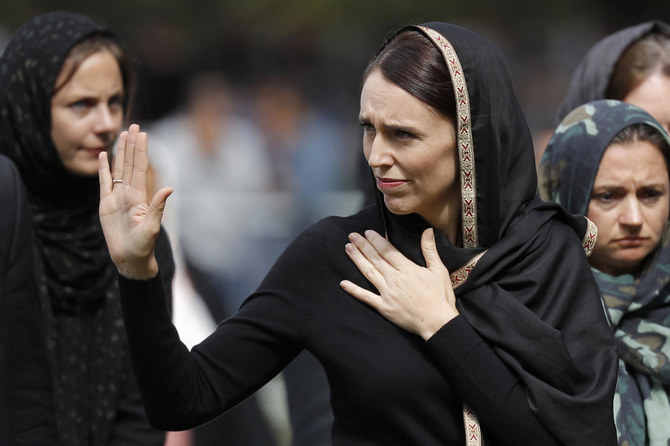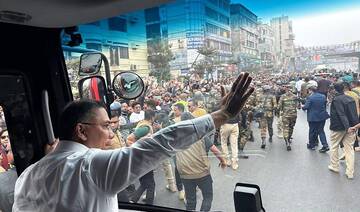WELLINGTON: New Zealand security agencies were almost exclusively focused on the perceived threat of Islamist terrorism before a white supremacist gunman killed 51 Muslim worshippers last year, a report into the country’s worst massacre found.
The Royal Commission of Inquiry also criticized police for failing to enforce proper checks when granting a firearms license to Australian gunman Brenton Tarrant, who released a racist manifesto shortly before the attack and streamed the shootings live on Facebook.
But despite the shortcomings, the report found no failings within government agencies that would have prevented the attack at two mosques in Christchurch on March 15, 2019.
“The commission made no findings that these issues would have stopped the attack. But these were both failings and for that I apologize,” Prime Minister Jacinda Ardern said after the report was released.
Tarrant was sentenced to life in prison without parole in August for the attack, which left dozens injured.
Ardern received global praise for her compassionate response to the attack and for swiftly banning the sale of the high-capacity semi-automatic weapons Tarrant used. She also launched a global movement against online extremism.
However, authorities were criticized for ignoring repeated warnings from the Muslim community that hate crimes against them were escalating.
The comprehensive 800-page independent report said there was an “inappropriate concentration of resources” on the threat of Islamist extremist terrorism.
Submissions to the commission by various Muslim organizations described how they felt they were targeted by security agencies while threats against them were not taken seriously.
“We find it concerning that the Commissioners found systemic failures and an inappropriate concentration of resources toward Islamic terrorism, and yet state that these would not have made a difference to the terrorist being detected prior to the event,” the Islamic Women’s Council said in a statement.
The royal commission report said there was no plausible way Tarrant’s plans could have been detected “except by chance.”
Other than an email Tarrant sent eight minutes before he opened fire, there was no other information available that could have alerted authorities to the attack, it said.
Gamal Fouda, the Imam of Al Noor mosque targeted by the shooter, said the report showed “institutional prejudice and unconscious bias” exists in government agencies.
The government accepted all 44 recommendations in the report, including establishing a new national intelligence and security agency, and appointing a minister to coordinate the government’s response.
The report found that despite having no history in New Zealand, Tarrant’s application for a firearms license was approved by the police.
The government said it would tighten firearm licensing laws, strengthen counter-terrorism laws, and make changes so police can better record and respond to hate crimes.
It recommended mandatory reporting of firearm injuries by health professionals, after it was revealed Tarrant was treated for injuries to his right eye and thigh after accidentally shooting himself while cleaning his gun a few months before the attack.
Health authorities also found that Tarrant took unprescribed steroids but they did not report the findings to the police either.
The report described Tarrant as “socially isolated” with few childhood friends but an avid Internet user and online gamer.
He frequented extreme right-wing discussion boards such as those on 4chan and 8chan but in an interview with the commission from his prison cell in Auckland Tarrant said Google-owned video sharing platform YouTube, was for him a far more significant source of information and inspiration.
Ardern said she planned to raise this “directly to the leadership of YouTube.”
Before arriving in New Zealand in August 2017, Tarrant traveled extensively, visiting dozens of countries between 2014 and 2017, mostly alone.
“The individual could present well and conducted himself in a way that did not attract suspicion. He was not identified as someone who posed a threat,” the report said.
Tarrant trained for the attack in New Zealand by developing expertise with guns at a rifle club, working out at a gym and taking steroids to bulk up, the report said.
New Zealand’s Ardern apologizes as report into mosque attack faults focus on Islamist terror risks
https://arab.news/b2znb
New Zealand’s Ardern apologizes as report into mosque attack faults focus on Islamist terror risks

- Report says no signs missed that would have prevented massacre
- NZ govt accepts 44 recommendations, including monitoring hate crimes
Bangladesh’s religio-political party open to unity govt

- Opinion polls suggest that Jamaat-e-Islami will finish a close second to the Bangladesh Nationalist Party in the first election it has contested in nearly 17 years
DHAKA: A once-banned Bangladeshi religio-political party, poised for its strongest electoral showing in February’s parliamentary vote, is open to joining a unity government and has held talks with several parties, its chief said.
Opinion polls suggest that Jamaat-e-Islami will finish a close second to the Bangladesh Nationalist Party in the first election it has contested in nearly 17 years as it marks a return to mainstream politics in the predominantly Muslim nation of 175 million.
Jamaat last held power between 2001 and 2006 as a junior coalition partner with the BNP and is open to working with it again.
“We want to see a stable nation for at least five years. If the parties come together, we’ll run the government together,” Jamaat chief Shafiqur Rahman said in an interview at his office in a residential area in Dhaka, days after the party created a buzz by securing a tie-up with a Gen-Z party.
Rahman said anti-corruption must be a shared agenda for any unity government.
The prime minister will come from the party winning the most seats in the Feb. 12 election, he added. If Jamaat wins the most seats, the party will decide whether he himself would be a candidate, Rahman said.
The party’s resurgence follows the ousting of long-time Prime Minister Sheikh Hasina in a youth-led uprising in August 2024.
Rahman said Hasina’s continued stay in India after fleeing Dhaka was a concern, as ties between the two countries have hit their lowest point in decades since her downfall.
Asked about Jamaat’s historical closeness to Pakistan, Rahman said: “We maintain relations in a balanced way with all.”
He said any government that includes Jamaat would “not feel comfortable” with President Mohammed Shahabuddin, who was elected unopposed with the Awami League’s backing in 2023.














